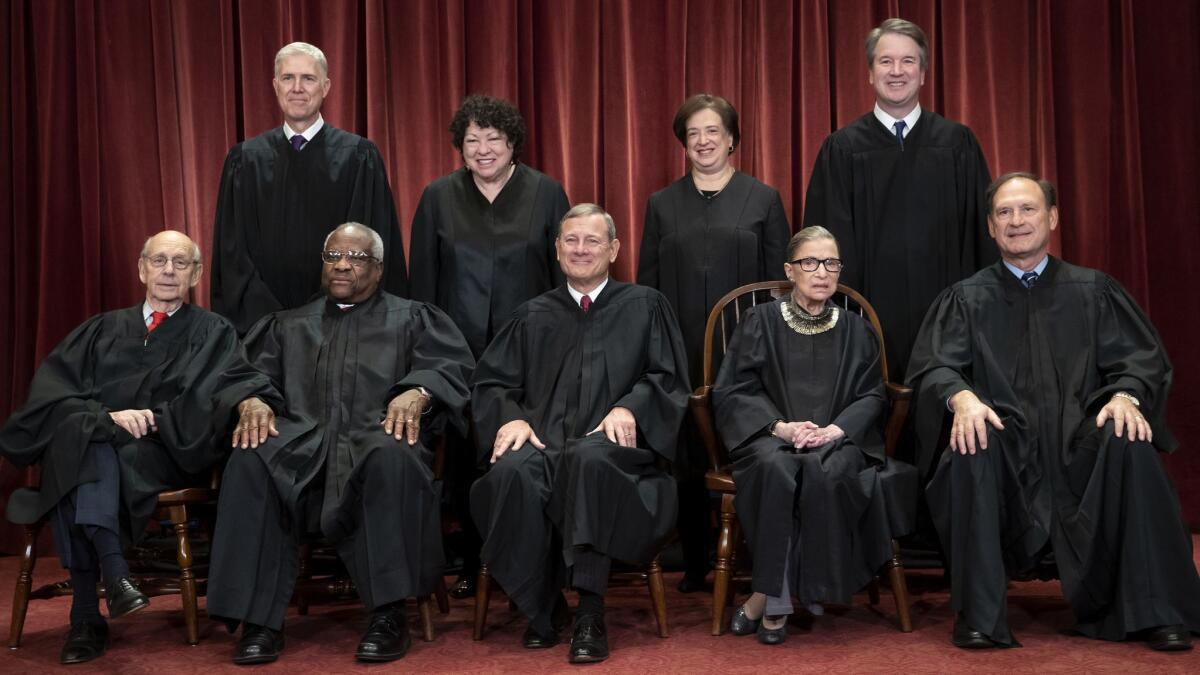Editorial: The Supreme Court tries to stay above the political fray

- Share via
The Supreme Court term that ended last week can be critiqued on the basis of the wisdom of the court’s decisions — or the lack of it. But it’s also appropriate to judge the justices, and particularly Chief Justice John G. Roberts Jr., on whether they safeguarded the court’s independence from partisan politics, as well as the perception of its independence.
By that measure the court earned a passing grade. That’s important because, while the court long has been the subject of political controversy, its credibility is especially compromised in these polarized times.
President Trump has contributed to the perception of politicization, describing a federal judge who ruled against the administration’s asylum policy as an “Obama judge.” (The chief justice pushed back in a rare public statement, saying: “We do not have Obama judges or Trump judges, Bush judges or Clinton judges.”) Meanwhile some Democrats have portrayed Trump’s judicial selections — including the judges he elevated to the Supreme Court — as untrustworthy agents of the far right or business interests.
In its recent term, the court did a good deal to dispel the idea that the justices always vote in partisan blocs.
The justices lived down to that expectation at times, separating into conservative and liberal blocs on some cases freighted with political overtones. See, for example, the 2018 decision upholding Trump’s ban on visitors from a number of Muslim-majority countries. And more recently, the execrable decision to duck the question of whether extreme partisan gerrymandering is unconstitutional.
But in its recent term, the court also did a good deal to dispel the idea that the justices always vote in partisan blocs. In at least some cases, they seem to have adopted Roberts’ philosophy of seeking consensus and avoiding sweeping decisions when possible.
Take the court’s 7-2 decision last month holding that a war memorial in the form of a giant cross on public land near a highway intersection in Maryland didn’t violate the 1st Amendment’s ban on an “establishment of religion.”
In our view, that was the wrong decision because the cross on public property could be viewed as an endorsement of Christianity. But frankly, the decision could’ve been a lot worse, and it disappointed conservatives who had hoped the court would use the case to announce a new, more permissive approach to government endorsement of religion. Instead, Justice Samuel A. Alito Jr.’s majority opinion instead rested heavily on the notion that the cross had stood on that spot for decades and had come to symbolize the nonreligious value of community gratitude to the war dead.
The court also showed restraint in sending back to an Oregon court a case involving bakers who were fined $135,000 for defying a civil rights law by refusing to bake a wedding cake for the marriage of two women. Social conservatives had seen the case as a vehicle for a broad holding that businesses could cite religious reasons for refusing to serve gay customers. That would have been disastrous. The court should ultimately say the opposite: that freedom of religion can’t be used as an excuse to engage in discrimination. But thanks to Trump’s conservative appointees, there may not be the votes on the court for that outcome.
Enter the Fray: First takes on the news of the minute »
The justices also disappointed conservatives by declining to review a federal appeals court ruling blocking an Indiana law that could have made it illegal for women to end a pregnancy because of the race or gender of the fetus or if they received a diagnosis of Down syndrome.
Finally and perhaps most important, Roberts joined the court’s liberal justices in a ruling that questioned the motives of the Trump administration in moving to add a question about citizenship to the 2020 census. Roberts said that the administration’s justification for asking the question — that it would help in enforcement of the Voting Rights Act — “seems to have been contrived.” That was a charitable description of the administration’s maneuvering, which seems to have been motivated by a desire to depress Latino participation in the census and as a result, reduce Democratic representation in the next round of redistricting. Roberts’ fellow Republican appointees should have joined him in that rebuke.
Finally, this term dispelled fears that Trump’s two appointees would always vote as interchangeable members of a “right-wing gang of five.” Neil M. Gorsuch has joined with liberal justices in criminal justice cases and Brett M. Kavanaugh joined the liberals in a 5-4 decision allowing an anti-trust lawsuit against Apple to go forward. No doubt the two justices called these cases as they saw them, based on their own flavor of conservative judicial philosophy. But the fact they don’t always vote as a partisan bloc is reassurance — and we need it — that the justices aren’t politicians in robes.
Follow the Opinion section on Twitter @latimesopinion and Facebook.
More to Read
A cure for the common opinion
Get thought-provoking perspectives with our weekly newsletter.
You may occasionally receive promotional content from the Los Angeles Times.










